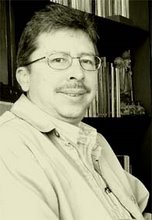Friday, May 25, 2007
By Harold Segura
I have always admired the speech ability of most priests and their skill for writing. So much the more if they are Cardinals or Bishops, who have an exquisite academic training and have enjoyed privileges accessible to very few, at least in these lands of the New World. Many of those participating in this Conference have read the classics in their original languages—Cicero in Latin and Aristotle in Greek; not few of them read Pascal in French, Bacon in English and Hegel in German. As I talked with one of the Spanish bishops, he was telling me that he learned classical Greek before biblical Greek (the koiné) and that he studied in Latin when he was an assistant to a parish priest in Switzerland. With great naturalness they tell about their studies under the shade of Karl Rahner, Yves Congar, Henri de Lubac, Hans Urs von Balthasar and even Joseph Ratzinger himself, when he was a professor at the University of Bonn. The founders of Latin American liberation theology drank from these same sources and enjoyed these privileges—this has been an elite of enlightened pastors, with the good and bad things this can involve. But I was referring to my admiration for their flowing speech and their easy pen. These days, every public presentation has been given with the purest style and, when writing, they all do so very easily, despite time pressures. On Tuesday morning the redaction work started, and yesterday, Thursday, by noon, we already had 86 written pages with the first draft of the final document. It is true that much revision and editing work is needed, but something formal already exists, which will be the basis for work in the following days. I think the final document will be a book with close to 150 pages. One of the Presidents announced yesterday that its length could be about one third of the one published in Puebla (1979).
This is a Church whose leaders speak well, write quickly and think with a certain depth, but—can they communicate? It is one thing to write well, from the perspective of the redactor, but from the viewpoint of the reader, understanding the text is a different thing. We are here, no longer in the terrain of language but in that of pastoral work. At this time, while the moderators and speakers from the seven groups left the hall for a meeting, the rest of us are listening to responses to the draft document. Several minutes ago we listened to Bishop José Francisco Ulloa (Costa Rica) asking the Assembly what to do to make sure that the document “will not risk ending up in the files.” He said he admired some paragraphs that were “so nicely worded,” but he thought they would not inspire conversion. The bishop suggested to attach “innovative pastoral lines” to each chapter. Another speaker was Professor Ana María Fons Martin, National Director of the Laity in Venezuela, who pointed to the urgency of saying things and living life in such a way that the Church “may re-enchant the world with Jesus Christ, to make possible an encounter with Him.” All this shows that there are concerns about the document, not for the propriety of the language but for its pastoral relevance.
What we need to hope will happen here is what we should also hope for in all other Christian churches and organizations that are interested in drafting lines of pastoral action—that the depth of the Truth will be written in a simple manner, so that the simplicity of the Gospel might be lived with actual depth. Is this a new way of understanding the old dichotomy between orthodoxy and orthopraxis? In the meantime, here I am, next to three bishops—Castrellón Pizano (Colombia), Eguren (Peru) and Rueda (Colombia)—and a layman, Daniel Casco (Paraguay), trying to draft the chapter on youth and children.
Harold
martes, 29 de mayo de 2007
 FLOWING SPEECH AND EASY PEN
FLOWING SPEECH AND EASY PEN
Suscribirse a:
Enviar comentarios (Atom)


No hay comentarios:
Publicar un comentario